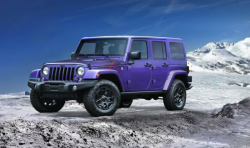— A Jeep Wrangler class-action lawsuit filed over radiator sludge and heating and cooling issues is moving forward after a federal judge found two of five claims against Chrysler viable.
According to the proposed class-action lawsuit, Chrysler uses a sand-casting method when manufacturing 2012-2017 Wrangler engines, but excess sand, sodium and other contaminants are left behind because the automaker fails to purge the sand from the cylinder heads.
The plaintiffs claim the sand and other particles seep from the engines into the radiators, heater cores, oil coolers and water pumps, forming a sludge-like material that accumulates in the radiators and reservoirs. This finally causes the heating and cooling systems to fail, not even allowing fog to be removed from windshields.
The Wranglers allegedly can't be fixed by flushing the radiator systems, so owners are forced to replace the radiators and engines to permanently fix the defects.
Chrysler filed a motion to dismiss the lawsuit and the judge ruled three of five plaintiff's claims don't stand up. However, FCA first sought to have the lawsuit dismissed due to a lack of standing.
The judge said the plaintiffs adequately plead they have the legal right to bring the lawsuit. In short, the radiator sludge problem the plaintiffs claim they suffer from are directly tied to alleged actions by Chrysler.
The judge ruled in favor of the plaintiffs concerning an express warranty claim and a Magnuson-Moss Warranty Act claim, starting with the express warranty claim.
The plaintiffs' claims are based in part on two express warranties that cover 2012-2017 Jeep Wranglers: The 3-Year/36,000 mile "basic limited warranty" and the 5-Year/100,000 mile "powertrain limited warranty."
The basic warranty "covers the cost of all parts and labor needed to repair any item" in the vehicle, with the exception of "tires and [u]nwired headphones."
The powertrain limited warranty is more limited in scope and "covers the cost of all parts and labor needed to repair" a list of particular vehicle components, including "cylinder head assemblies" and other parts of the engine.
The judge says everyone basically admits that none of the named plaintiffs sought repairs within the time and mileage limits as stated in the basic limited warranty, but owners did meet the time requirements concerning the powertrain limited warranty. Chrysler argues the repairs that were made did not involve any of the components covered by the powertrain warranty.
However, the judge found the allegations set forth by the plaintiffs are not that the heating and cooling systems are defective, but the owners instead claim the heating and cooling problems are caused by underlying manufacturing defects in the engine cylinder heads.
Those parts are expressly covered by the powertrain warranty, causing the judge to decline to dismiss the express warranty claim.
The other claim the judge let go through is the Magnuson-Moss Warranty Act (MMWA) claim. The judge ruled that because the plaintiffs stated a claim for breach of express warranty, Chrysler's motion to dismiss the MMWA claim is also denied.
The remaining claims didn't work out as well for the plaintiffs, as the judge dismissed a breach of implied warranty claim. Chrysler told the judge the implied warranty claim is time-barred by the statute of limitations, something the plaintiffs didn't even oppose.
Because they failed to oppose Chrysler's grounds for dismissal, the judge ruled the plaintiffs had abandoned their implied warranty claim.
The judge also dismissed counts four and five of the lawsuit that allege unfair and deceptive trade practices and false advertising.
Chrysler argues that both claims are barred by the statute of limitations because the allegedly deceptive acts occurred more than three years prior to the filing of the lawsuit, and the judge fully agreed.
The Jeep Wrangler class-action lawsuit was filed in the U.S. District Court for the Southern District of New York - Malizia et. al. v. FCA US, LLC.
The plaintiffs are represented Greg Coleman Law PC, Simmons Hanly Conroy LLC, and Whitfield Bryson & Mason LLP.
CarComplaints.com has complaints about the Jeeps named in the class-action lawsuit:

